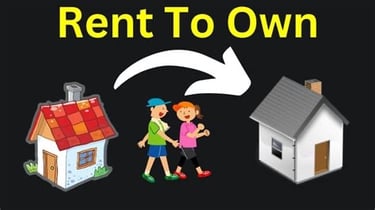Lease-to-Own Mortgages in Thailand: A Viable Option?
Thailand's real estate market is diverse and dynamic, offering various property options for potential homeowners. However, financing options for foreigners are extremely limited, making it challenging to obtain a mortgage. The desire to own property in Thailand is high, but the lack of financing remains the number one obstacle for most buyers.
Author: Mark Kreitzman - over 20 years experience investing in Thailand real estate, crypto/blockchain and cybersecurity expert
6/10/20244 min read


Lease-to-Own Mortgages in Thailand: A Viable Option?
Thailand's real estate market is diverse and dynamic, offering various property options for potential homeowners. However, financing options for foreigners are extremely limited, making it challenging to obtain a mortgage. The desire to own property in Thailand is high, but the lack of financing remains the number one obstacle for most buyers.
While there are some mortgage options available for Chinese or Singaporean nationals through banks like those in China or UOB in Singapore, Thai banks stopped offering mortgages to foreigners in 2016. This leaves foreigners with a few options: (1) paying cash, (2) getting a loan from their home country based on their assets, or (3) seller financing, also known as rent-to-own or lease-to-buy. Although seller financing is rare in Thailand, it is possible and offers a unique way to secure property rights while limiting risks related to health changes or global economic downturns.
Understanding Lease-to-Own Mortgages
A lease-to-own mortgage, also known as a lease-purchase agreement, allows prospective buyers to lease a property with the intention of purchasing it later. In this arrangement, a portion of the rent paid during the lease period is credited towards the eventual down payment or purchase price of the property. This can be particularly advantageous for individuals who need time to improve their financial situation or build credit before securing a traditional mortgage.
How It Works
1. Agreement Terms: The lease-to-own contract outlines the terms of the lease period, typically ranging from one to five years, and specifies the future purchase price of the property. This price can be fixed at the start of the lease or determined by market value at the time of purchase. Given the fluctuations in Thailand’s property prices due to currency conversion rates and other factors, a fixed price is generally recommended.
2. Option Fee: Tenants usually pay an upfront option fee, granting them the exclusive right to purchase the property within the agreed timeframe. This fee is often non-refundable but is typically credited towards the purchase price if the tenant decides to buy.
3. Monthly Payments: A portion of the monthly rent is allocated towards the down payment or purchase price. This helps tenants build equity in the property over time, effectively reducing the amount needed to finance the purchase.
4. Purchase Decision: At the end of the lease term, the tenant has the option to purchase the property. If they choose not to buy, the option fee and any rent credits typically remain with the seller.
Benefits of Lease-to-Own Mortgages
1. Accessibility: Lease-to-own mortgages can be a viable option for those who may not immediately qualify for traditional financing due to poor credit or lack of a substantial down payment. This arrangement provides time to improve financial standing while securing a future home.
2. Price Security: Locking in the purchase price at the beginning of the lease can protect tenants from potential market price increases, offering peace of mind and financial predictability.
3. Equity Building: As a portion of the rent is credited towards the purchase price, tenants effectively build equity in the property, making it easier to secure a mortgage when it’s time to buy.
4. Trial Period: Living in the home before committing to purchase allows tenants to ensure the property meets their needs and expectations.
Considerations and Risks
1. Legal and Financial Advice: It’s crucial to seek legal and financial advice to fully understand the terms and implications of the lease-to-own agreement. This helps protect both parties and ensures a fair and transparent process.
2. Non-Refundable Fees: The option fee and rent credits are typically non-refundable if the tenant decides not to purchase the property. This can be a significant financial loss if circumstances change.
3. Market Fluctuations: While locking in a purchase price can be beneficial, it also means committing to buy regardless of future market conditions, which could be a disadvantage if property values decline.
Legal Framework in Thailand
Foreigners interested in lease-to-own mortgages should be aware of Thailand's property ownership laws. While foreigners can own condominium units outright, they cannot directly own land. However, they can lease land for up to 30 years, with renewal options. Engaging with a local legal expert is essential to navigate these legal nuances and ensure the agreement is enforceable.
You must also agree with the seller on limitations of modifications to the property before you actually take title. The seller may not want you making changes to the property, possibly reducing the value of the asset or increasing their inability to sell if you were to back out of the arrangement. One of the benefits of the seller is that you would be putting enough money down initially that is non-refundable if you were to back out, but the seller is still going to need to reduce their risk that a buyer strips the condominium, for example, and then backs out leaving the seller with a property they can’t event rent until they invest time and money to repair.
Conclusion
Lease-to-own mortgages in Thailand offer a flexible and practical route to homeownership, especially for those facing financial barriers to traditional property acquisition. By understanding the benefits and potential risks, and seeking appropriate legal guidance, prospective buyers can leverage this innovative financing method to secure their dream home in Thailand's vibrant real estate market. The Thai legal system supports this type of arrangement, with strong consumer protection and accessible court systems, provided the agreement is established correctly.
If you are interested in a lease-to-own arrangement, then check out the properties listed on this website as the owner is open to this option (www.kandiplaces.com)
